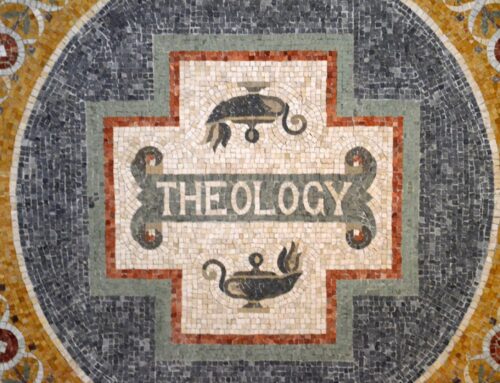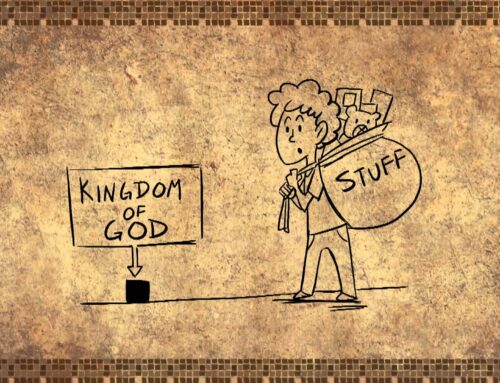Minimalism Lifestyle: The Easy Yoke
December 9, 2020
Categories: Minimalism
This post is Part 6 in a 6-part blog series on Minimalism and Faith. (If you missed the first post, you can find it here.) There’s a really interesting passage in the Gospel of Matthew where Jesus says the following: “Come to me, all you who are weary and burdened, and I will give you rest. Take my yoke upon you and learn from me, for I am gentle and humble in heart, and you will find rest for your souls. For my yoke is easy and my burden is light” (Matthew 11:28-30).
Yoke
If we didn’t grow up on a farm, we might not be familiar with what a yoke is. A yoke is a wooden crosspiece that is fastened over the neck of two animals and attached to the plow or cart that they are to pull. So, this is kind of a paradoxical thing for Jesus to say, because a yoke involves putting something on your back to do hard work. What does it mean that Jesus’ yoke is “easy?”
Way of Doing Life
In the book “The Ruthless Elimination of Hurry,” John Mark Comer explains that the yoke of Jesus is a lifestyle. In other words, it’s a way of doing life. And for most of us, life is hard work. Jesus never said life would be easy. In fact, he promises the opposite: “In this world you will have trouble” (John 16:33). But there are different ways of doing life and navigating the struggles that come up along the way. There are different “yokes.”
The Lifestyle of Jesus
In Christianity, we don’t often focus on Jesus’ lifestyle. We focus a lot on having correct beliefs about Jesus, and we focus a lot on the death and resurrection of Jesus. We also focus quite a bit on the miracles of Jesus. But we don’t focus much on the day-to-day rhythms of Jesus’ life. But these day-to-day rhythms are essential to becoming a disciple and follower of Jesus.
Comer discusses 4 key components of the lifestyle of Jesus. They are easy to remember because they all start with the letter “S.”
Silence and Solitude
During his ministry, Jesus often went off by himself to be alone with God. This is interesting because as Jesus grew more popular, there was a lot of good work to be done. But consistently throughout his life, Jesus made it a priority to center himself and spend time alone with God. For example, in the Gospel of Luke, the author writes: Yet the news about him (Jesus) spread all the more, so that crowds of people came to hear him and to be healed of their sicknesses. But Jesus often withdrew to lonely places and prayed (Luke 5:15-16). In our culture today, we don’t prioritize silence and solitude. Many of us are uncomfortable with silence and solitude, and reach for our cell phones whenever we have some empty space in our day. But if we want to experience the “easy yoke” of Jesus, silence and solitude is key.
Sabbath
Honoring the Sabbath was one of the original 10 commandments: Remember the Sabbath day by keeping it holy. Six days you shall labor and do all your work, but the seventh day is a sabbath to the Lord your God. On it you shall not do any work, neither you, nor your son or daughter, nor your male or female servant, nor your animals, nor any foreigner residing in your towns. For in six days the Lord made the heavens and the earth, the sea, and all that is in them, but he rested on the seventh day. Therefore the Lord blessed the Sabbath day and made it holy (Exodus 20:8-11). Jesus affirmed the Sabbath, but confronted the religious leaders who were rigid about the Sabbath and had a bunch of picky rules about what people could and couldn’t do: “The Sabbath was made for man, not man for the Sabbath” (Mark 2:27). In our culture today, we have mostly given up on the traditional rhythm of work and sabbath. There is so much that “needs to be done,” many of us work all the time, which contributes to our increasing levels of stress and anxiety.
Simplicity
Jesus lived a simple life. We don’t know much about his early life, but tradition says that he worked as a carpenter and studied the Scriptures. During his ministry, he traveled from place to place by foot. He spent most of his time teaching his disciplines, healing people who needed it, and confronting the religious leaders of his day. He taught strongly against greed and accumulating material possessions (e.g., “Watch out! Be on your guard against all kinds of greed; life does not consist in the abundance of possessions” [Luke 12:15]). As far as we know, he didn’t own much of anything—he didn’t even have a home (e.g., “Foxes have dens and birds have nests, but the Son of Man has no place to lay his head” [Luke 9:58]). Jesus lived a simple life, and encourages us to do so as well. But for many Christians in the United States, we try to accumulate as much wealth as possible. We buy bigger houses and cars, and rent storage units to contain the possessions that don’t fit in our home. These practices lead to more stress and anxiety in our lives. If we want to experience the easy yoke of Jesus, we need to drastically simplify our life.
Slowing
Jesus didn’t live his life in a rush. He slowed himself down and had time to connect with others, himself, and God. For example, when people asked him to bless their children, his disciples rebuked them, but Jesus slowed down and prioritized connecting (“Let the little children come to me, and do not hinder them, for the kingdom of heaven belongs to such as these” [Matthew 19:14]). Similarly, when a blind man called out to Jesus for mercy as he was passing by, those who led the way rebuked him and told him to be quiet. But Jesus stopped. He had time for the blind man, and connected with him and healed him (Luke 18:35-43). In the story of the Good Samaritan, the hero in the story was the one who stopped and took time to care for the man who was beaten and left for dead (Luke 10:25-37). When Jesus was dining at the home of Mary and Martha, Mary sat at Jesus’ feet while Martha was busy serving and preparing dinner. When Martha complained, Jesus gently reminded her that it was okay to slow down and sit at the feet of Jesus (Luke 10:38-42). In our culture today, we want everything immediately. We eat fast food, watch movies on demand, and get our packages in one day with Amazon Prime. But we have lost something—the peace that comes with slowing down and being present in each moment without feeling the need to rush on to the next one.
True Life
If we want to be a disciple of Jesus and experience everything he has for us, it’s not enough to have the right beliefs about Jesus, and follow the religious commands that Jesus gives us. We have to follow the lifestyle of Jesus—the easy yoke. By practicing silence and solitude, Sabbath, simplicity, and slowing, we can follow the example of Jesus and experience peace and true life.

Related Thoughts
One Comment
Leave A Comment

Subscribe To My Newsletter
Join my mailing list to receive the latest blog posts.
Receive my e-book “The Mental Health Toolkit” for free when you subscribe.






[…] PreviousNext […]